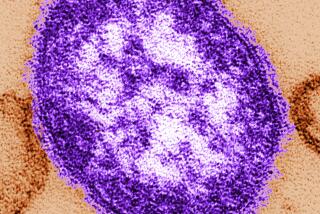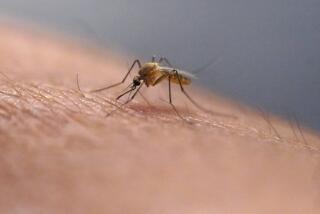Disneyland shuts down 2 cooling towers after Legionnaires’ disease sickens park visitors

- Share via
Disneyland has shut down two bacteria-contaminated cooling towers after Orange County health officials discovered several cases of Legionnaires’ disease in people who had visited the Anaheim theme park, authorities said.
Twelve cases of the bacteria-caused illness were discovered about three weeks ago among people who had spent time in Anaheim and included nine people who had visited Disneyland in September before developing the illness, according to the Orange County Health Care Agency. Their ages ranged from 52 to 94.
The remaining three were Orange County residents who did not visit the park but lived or traveled in Anaheim.
Ten were hospitalized and one person “with additional health issues” died, according to health officials. That person did not visit Disneyland.
Legionnaires’ is a severe lung infection caused by exposure to contaminated water or mist. Authorities said they have not tied any other cases of Legionnaires’ to Anaheim since September.
“There is no known ongoing risk associated with this outbreak,” the healthcare agency said in a statement.
The towers are in a backstage area near the New Orleans Square Train Station, each more than 100 feet from areas accessible to guests, a Disneyland Resort spokeswoman said Friday. A Disneyland employee is among those who fell ill with the disease.
“On Oct. 27, we learned from the Orange County Health Care Agency of increased Legionnaires’ disease cases in Anaheim. We conducted a review and learned that two cooling towers had elevated levels of Legionella bacteria,” Dr. Pamela Hymel, chief medical officer for Walt Disney Parks and Resorts, said in a statement Friday. “These towers were treated with chemicals that destroy the bacteria and are currently shut down.”
The U.S. Centers for Disease Control and Prevention notified county authorities about three weeks ago of several cases of the disease among people who had traveled to Orange County in September. County epidemiologists discovered that a cluster of people diagnosed with the disease had recently visited, lived or worked in Anaheim and contacted Disney after learning that several of them had gone to the theme park.
According to the health agency, on Nov. 3 Disney reported that routine testing had detected elevated levels of Legionella in two cooling towers a month earlier, and the towers had been disinfected. Disney took the towers out of service on Nov. 1, performed more testing and disinfection, and brought them back into service on Nov. 5.
Disney took the towers out of service again on Tuesday in advance of an order the health agency issued the following day requiring they remain down until test results verify they are free from Legionella contamination.
The towers had been turned off on Nov. 1 before Disney learned that Legionella had been detected, Disneyland Resort spokeswoman Suzi Brown said. “The only reason they were turned back on was as part of the further disinfection process.”
The county health agency has also alerted healthcare providers to look for Legionnaires’ disease in anyone who may have become ill after visiting Anaheim or Disneyland before Nov. 7.
It takes two to 10 days for symptoms of Legionnaires’ to appear.
The disease is caused by Legionella bacteria that grow in water and can spread when small droplets get into the air and people breathe them in, according to the CDC. Outbreaks are often traced to hot tubs, decorative fountains, cooling towers and large air-conditioning systems that emit water vapor into the air. Legionnaires’ is not spread person to person.
The illness can be treated with antibiotics and hospital care, but about 1 in 10 people who get Legionnaires’ disease die from the infection. Most at risk are people older than 50 with weakened immune systems or chronic lung diseases.
Orange County has recorded more than 55 cases of the disease this year and has seen the number of cases jump in recent years. A similar upward trend has been seen nationally and elsewhere in Southern California, according to the healthcare agency, though what’s causing that is unclear.
UPDATES:
6:55 a.m.: Updated with a quote from spokeswoman Brown.
This article was first published at 5:25 a.m.
More to Read
Sign up for Essential California
The most important California stories and recommendations in your inbox every morning.
You may occasionally receive promotional content from the Los Angeles Times.










